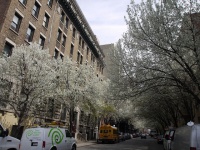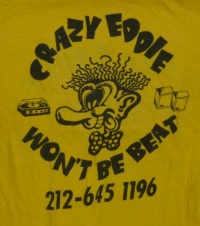Chapter 1
How to Format Entries
Quoted Text
Explanation or analysis of Quoted Text
- Individual opinions or discussion. Sign by writing "~~~", if you like.
To add a page: Type ==Page xx==
Please add entries for each page in the order they appear on the page.
Contents
Title
"Bleeding Edge" has a number of meanings. See Bleeding Edge Title. The phrase first appears on pg. 78 — "What's known as bleeding-edge technology. [...] No proven use, high risk, something only early-adoption addicts feel comfortable with."
Cover
The cover photograph is of a server farm. I found it here. It's entitled "Server Farm at Night." Note how the image also evokes the World Trade Center, and the cover of Pynchon's V. ...
More info at Bleeding Edge cover analysis
Book jacket description
Pynchon likely wrote the copy for the book jacket description of Bleeding Edge and he likely did the same for Inherent Vice.
Epigraph
Donald Edwin Westlake (July 12, 1933 – December 31, 2008) was an American writer, with over a hundred novels and non-fiction books to his credit. He specialized in crime fiction, especially comic capers, with an occasional foray into science fiction or other genres. He was a three-time Edgar Award winner, one of only three writers (the others are Joe Gores and William L. DeAndrea) to win Edgars in three different categories (1968, Best Novel, God Save the Mark; 1990, Best Short Story, "Too Many Crooks"; 1991, Best Motion Picture Screenplay, The Grifters). In 1993, the Mystery Writers of America named Westlake a Grand Master, the highest honor bestowed by the society. More on Wikipedia
See and hear Westlake paraphrase/misquote himself by calling New York City "the enigmatic blond who knows the answer but isn't going to tell you." Youtube
New York Times article containing the epigraph proper.
Title Page
Flatiron Building
The title page feature a photograph of the Flatiron Building, a skyscraper in NYC. "The neighborhood around it is called the Flatiron District after its signature building, which has become an icon of New York City." Wikipedia
Dedication
Like Inherent Vice and Against the Day, Bleeding Edge has no dedication. Pynchon dedicated three of his earlier novels to friends and family: Mason & Dixon ("For Melanie, and for Jackson"), Vineland ("For my mother and father"), and Gravity's Rainbow ("For Richard Fariña").
Page 1
"the first day of spring, 2001"
three instances of beginnings: the first day, of spring (the season of beginning and renewal), of the new millennium.
"though some still have her in their system"
the novel's first sentence invokes the topic of personal data held in various databases or systems.
Loeffler
Literally translated from German, it means 'someone who eats with a spoon'. It is not an uncommon last name in Germany; it is also the German name of a bird, the Eurasian Spoonbill. Wikipedia
"walking her boys to school"
This scene -- a parent walking children to school in the Upper West Side of New York City -- is, more than any of Pynchon's novels, evocative of what is reported of Pynchon's biography.
- This could be an early hint that the novel has a more autobiographical element than any of his previous works? Benvolio (talk)

Callery Pear trees
Planted extensively in NYC due to its fast-growing nature and tolerance of pollution and other extreme conditions. Central Park Conservancy Their blooming is a first sign of spring.
- Much has been written on how Callery trees smell like semen. E.g., article
she drifts into a pick
A "pick" is a basketball term. It refers to an offensive player blocking a defensive player.
Page 2
unsheltered
a term meaning those homeless who sleep in such places as doorways and lobbies. "The word unhoused refers to that segment of a homeless community who do not have ordinary lawful access to buildings in which to sleep, as referred to in the HUD [United States Department of Housing and Urban Development] definition as persons occupying "place not designed for ... sleeping accommodation for human beings." "Wikipedia
added thought: Pynchon has tickled his creatures with Heideggerian thought throughout his writing. Unsheltered is not the "normal" way in which we describe our "homeless".
Razor scooters
a popular brand of scooter, but note how the word "razor" echoes/evokes the title, Bleeding Edge.
Otto Kugelblitz
German, "ball lightning". The Kugelblitz was also the name of a tank in WWII. Wikipedia
- Many references to Germany, German words, names and German history run throughout Pynchon's oeuvre, to the point where Pynchon scholar David Cowart posits that "Pynchon seems to have had a German period, a post-German period, and a neo-Continental or global period. During his German phase he produced his first three novels... His next work, the long-awaited Vineland, represents a new phase in which the almost obsessive attention to German more seems to have faded." Thomas Pynchon and the Dark Passages of History (2012), at p. 59. Benvolio (talk)
- A character name Skip the sentient ball lightning appears in Against the Day. [1]
on a cross street Law & Order has so far managed not to film on
Law & Order was the longest running crime drama on TV. It ran for 20 seasons and filmed its episodes on the streets of New York City. Of course, this adds to building sense of paranoia and fear in this opening description.
Berggasse 19
The address in Vienna where Freud lived. It is now the site of the Sigmund Freud Museum.
Page 3
Vyrva
The name sounds like the German word "Wirrwarr", meaning something like "muddle", "huddle", etc.
"Maxi, hi?"
Vyrva speaks in uptalk, or phrasing statements like questions, a linguistic characteristic found (among other places) in Southern California, especially among so-called "Valley girls". Wikipedia
Page 4
antennas for the unspoken
Cf, a letter by Pynchon: "Given the British genius for coded utterance, this could all be about something else entirely, impossible on this side of the ocean to appreciate in any nuanced way..." Source
Page 6
the gates of Danbury
a federal prison. Wikipedia
Crazy Eddie
American electronics store famous for its radio and TV ads in the 60s and 70s, featuring the slogan, "his prices are insane". The T-shirt in question was designed by, of all people, Robert Crumb. The TV ads featured New York disc jockey Jerry Carroll as the pitchman. Wikipedia
"Crazy Eddie" also features prominently in the science fiction novel The Mote In God's Eye by Larry Niven and Jerry Pournelle (1974), signifying both the point of insanity and the furthest known reaches of the universe as the author's aliens see it.
Page 7
as Britney always sez
"Oops! I Did It Again" was a huge pop hit in 2000 for Britney Spears.
"Help Me Rhonda"
1965 song by the Beach Boys. Pynchon reportedly recommended that Jules Siegel listen to the Beach Boys' Pet Sounds, as recounted in Siegel's article, "Who is Thomas Pynchon, and Why Did He Take Off With My Wife" (1977). Pynchon mentions "Help Me Rhonda" and two other Beach Boys hits in Inherent Vice. [2]
| Chapter 1 pp. 1-7 |
Chapter 2 pp. 8-19 |
Chapter 3 pp. 20-29 |
Chapter 4 pp. 30-40 |
Chapter 5 pp. 41-52 |
| Chapter 6 pp. 53-67 |
Chapter 7 pp. 68-79 |
Chapter 8 pp. 80-86 |
Chapter 9 pp. 87-95 |
Chapter 10 pp. 96-111 |
| Chapter 11 pp. 112-120 |
Chapter 12 pp. 121-133 |
Chapter 13 pp. 134-144 |
Chapter 14 pp. 145-159 |
Chapter 15 pp. 160-171 |
| Chapter 16 pp. 172-184 |
Chapter 17 pp. 185-197 |
Chapter 18 pp. 198-210 |
Chapter 19 pp. 211-218 |
Chapter 20 pp. 219-229 |
| Chapter 21 pp. 230-238 |
Chapter 22 pp. 239-246 |
Chapter 23 pp. 247-255 |
Chapter 24 pp. 256-264 |
Chapter 25 pp. 265-273 |
| Chapter 26 pp. 274-287 |
Chapter 27 pp. 288-300 |
Chapter 28 pp. 301-313 |
Chapter 29 pp. 314-326 |
Chapter 30 pp. 327-337 |
| Chapter 31 pp. 338-346 |
Chapter 32 pp. 347-353 |
Chapter 33 pp. 354-364 |
Chapter 34 pp. 365-382 |
Chapter 35 pp. 383-394 |
| Chapter 36 pp. 395-407 |
Chapter 37 pp. 408-422 |
Chapter 38 pp. 423-438 |
Chapter 39 pp. 439-447 |
Chapter 40 pp. 448-462 |
| Chapter 41 pp. 463-477 |
